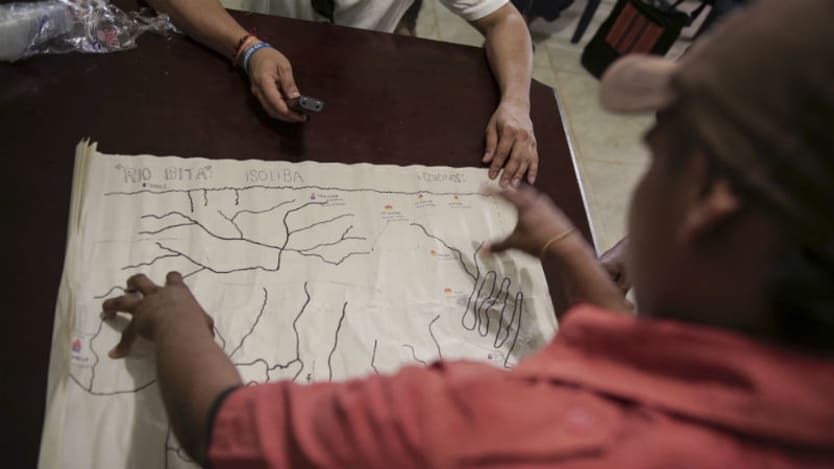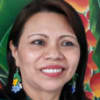Opinion: Protect indigenous, community, and women's land rights for food security and nutrition

Around 1 in 9 people in the world — 821 million — are undernourished. After a prolonged decline, the Food and Agriculture Organization of the United Nations found that world hunger is rising once again.
The world’s food systems need to be transformed to curb this trend. Legally recognized and protected land rights for indigenous peoples and local communities in the developing world are a key part of revitalizing the world’s food systems. In particular, the rights of rural and indigenous women to support diverse, local agricultural production require urgent attention.
Securing land rights for women
Many indigenous women know what insecure land rights and food insecurity look like. When rights are recognized, by contrast, the impact is significant: Women can improve their families’ diets and generate surpluses for the market; take advantage of wild biodiversity for medicinal and cultural practices; and enjoy the land from their own worldview.
Raising awareness: Fany Kuiru, Uitoto woman from the Colombian Amazon
As an Uitoto indigenous woman from the Colombian Amazon, I know that food insecurity is linked to many factors — including conflict in indigenous territories that has led to forced displacement and prevented women from accessing their lands for traditional cultivation practices.
As a child, I lived this reality. My community faced violence and hunger at the hands of a rubber company that operated on our lands for more than 33 years. Many of my people were enslaved, killed, and displaced from our territories. I became involved at a young age in working to recover our lands — and ultimately, we obtained a legal collective title as an indigenous reserve.
In times of violence and conflict, the role of indigenous women as “guardians” of seeds and cultural knowledge is of vital importance. Because our grandmothers were enslaved, they could not produce their traditional crops. But they had the bravery to plant their seeds at night — and when the conflict was over, to cultivate and rebuild. Following in their footsteps, a group of us Uitoto women created the Women, Weaving, and Knowledge Cultural House, or Mutesa, for indigenous women displaced by armed conflict to develop traditional handicrafts, clothing, and gastronomy.
Indigenous peoples and local communities feed not only themselves — they also feed the world. Seventy percent of the world’s food is produced by small-scale producers. There is a huge amount of evidence that there are few economies of scale in farming and that family farms are the most efficient way of organizing agriculture. Small-scale food production tends to be more sustainable and benefit more people than large-scale plantations, provides the diversity needed for a healthy diet, and strengthens the resilience and adaptive capacity of our food systems.
Yet all too often, governments fail to recognize indigenous peoples’ and local communities’ rights: They collectively manage more than half the world’s land, but only have legally secured rights to 10 percent. Women are particularly likely to lack rights to community lands and resources.
There is an urgent need to close this gap: Up to 2.5 billion people worldwide directly depend on indigenous and community lands to support their livelihoods, their food, and their health.
The importance of local land rights
Many countries do not recognize local land rights and exclusively focus on large-scale agricultural production — often under a monocropping approach — because they believe it will bring economic benefits. But this does not always improve food security.
In Myanmar, for example, agricultural policies have mainly supported the country regaining its status as the “rice bowl of Southeast Asia.” But Myanmar populations lack dietary diversity: Rice consumption accounts for two-thirds of daily calorie uptake; women of reproductive age are malnourished; and on average 29 percent of children under 5 years are stunted. Rice farming has also failed to lead to prosperity for local peoples: Income from rice-growing is significantly lower than from other crops such as pulses.
“It is essential to support the government of Myanmar to address land tenure issues for better enabling the diversification of agricultural production, which is central for transforming the agricultural sector, increasing dietary diversity for women and small children, and reducing malnutrition.”
— Paul De Wit, senior land tenure adviser, FAO-EUThere is high potential for local people in Myanmar to produce nutritious foods such as beans, fruits and vegetables, fish and poultry, as well as high-value cash crops including coffee, yams, ginger, cardamom, and turmeric. Yet many of these are grown on lands where local peoples lack secure rights. Resistance to recognizing and protecting the rights of local peoples over their customary lands has contributed to the high rates of poverty, hunger, and malnutrition. Previous governments allocated many local peoples’ lands to commercial agriculture investors. However, only 18 percent of the 4 million acres granted as agricultural concessions since the mid-1990s have been developed for production.
Action for a secure future
This week, communities and activists are mobilizing across the world to raise awareness of the connection between secure land rights and global food security. While our experiences are worlds apart, we have the same recommendations for governments to tackle food security, nutrition, and sustainable agriculture:
1. Governments must recognize the rights of indigenous peoples and local communities to their customary lands. Failure to do so leaves the world vulnerable to losing the diversity in our food and the seeds to grow this food.
2. Smallholder-driven diversification of agricultural production, underpinned by secure land rights, is essential in a world increasingly exposed to climatic, social, and economic shocks.
3. Women must be recognized and supported as the guardians of food security, nutrition, health, and overall well-being. The rights of women to make decisions over land and its use must be strengthened under both customary and statutory systems.
Governments should increasingly invest in smallholder farming as the backbone of agricultural development to address the second Sustainable Development Goal: “End hunger, achieve food security and improved nutrition, and promote sustainable agriculture.”
We see immediate opportunities across the world to fight hunger, end malnutrition, and provide a solid base to sustain these gains for the health and security of future generations.
This article is part of a mini-series in partnership with the Rights and Resources Initiative. For more on land and resource rights for indigenous peoples and local communities take a look at RRI’s work here.
Search for articles
Most Read
- 1
- 2
- 3
- 4
- 5









